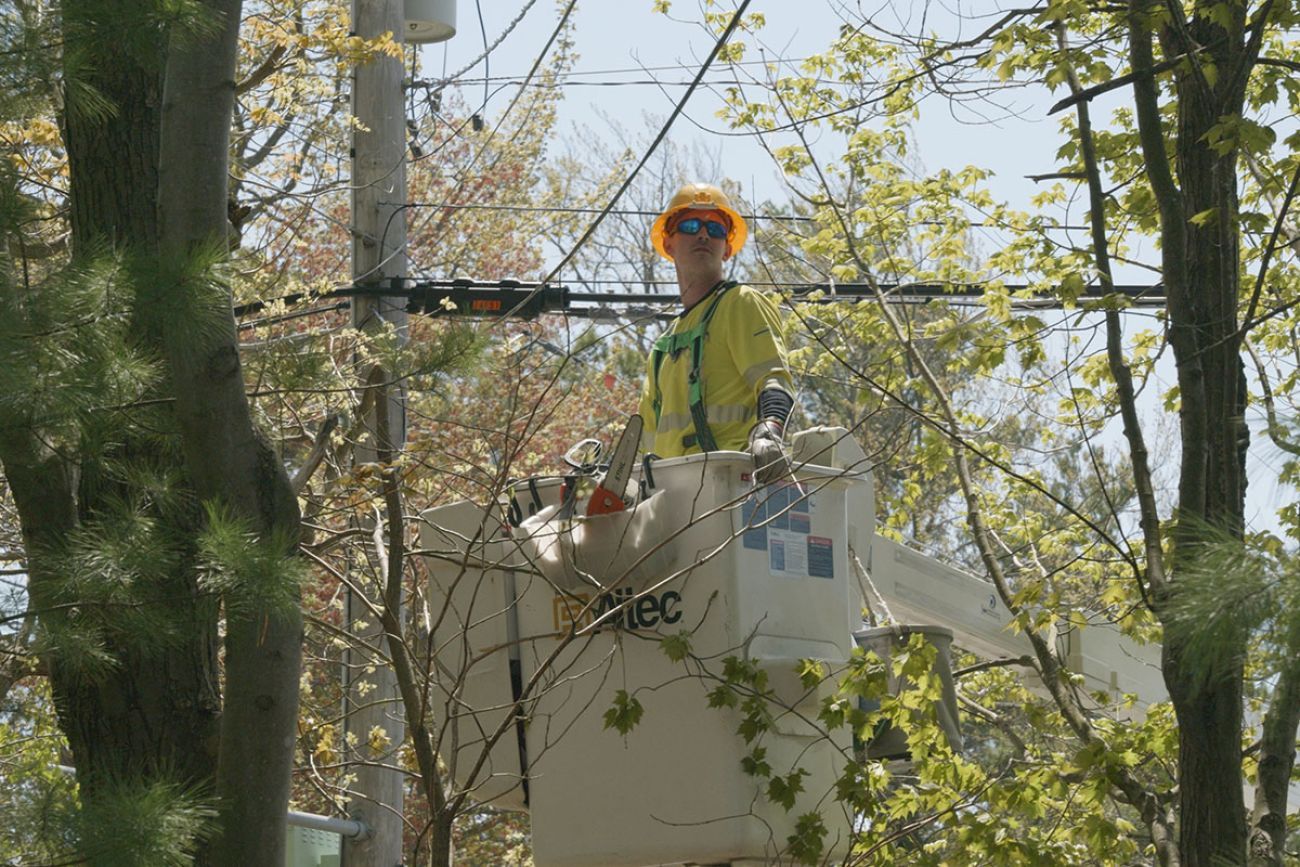Michigan near tops in nation for outages. Utilities want to raise rates

- New data shows Michigan has more power outages lasting longer than eight hours than most other states
- Only two states, Texas and California, had more severe outages than Michigan in the past five years
- Although regulators say the performance is unacceptable, they’ve approved rate hikes that make electric bills some of the highest in nation
Diana Brown Wilhelm has heard one constant complaint from constituents since she became a Midland City Council member in 2011: power outages.
“I swear, we were having them monthly if not more,” Brown Wilhelm said.
That put pressure on seniors in her northeast Midland district, some of whom rely on oxygen and other medical devices. “They need power for those things to run.”
It’s not just Midland. By any measure, Michigan residents are affected by more — and longer-lasting — power outages than almost any other state, despite paying some of the highest rates, new data shows
The performance of Michigan’s two dominant utilities — DTE Energy and Consumers Energy — again is under scrutiny, as hot weather puts a strain on the system and DTE seeks a $456 million rate increase from state regulators that would boost average residential bills $100 or more per year.
Since 2000, Michigan trailed only Texas and California in major outages — those affecting 50,000 customers or more — even though those states have far more residents and are significantly larger, according to an analysis by Climate Central, a research and communications nonprofit.
A separate Bridge Michigan analysis of county-level outage data found that, among the nation’s most populous counties, Michigan residents are more likely to endure an outage of 8 hours or longer, far more than peers throughout the Great Lakes and on par with Texas.
Some counties — Cass and Berrien in southwest Michigan and Alcona northeast — had over 50 outages in which 5% of customers had an 8-hour outage or longer in the last five years.
Related:
- Detroit gains residents for first time in decades. Check your city’s change
- Blood lead levels continue to fall in Michigan: Look up your ZIP code
- Northern Michigan, after years of struggle, is gaining residents again
Only one county, Houghton, had none, according to the data.
“The level of performance is unacceptable,” Dan Scripps, chair of the Public Service Commission, a government agency that oversees utilities.
“That's maybe the thing we can all agree on — and trying to get to a better place.”
The state agency responsible for overseeing utilities, the Michigan Public Service Commission, fielded 2,700 outage complaints last year, more than quadruple the annual average of 600 from 2014 to 2020.
The number of major outages has risen in each of the last three years, from 15 to 16 to 17. The previous high from 2000 to 2020 was 11.
And complaints are increasing even as Consumers Energy and DTE Energy, have spent hundreds of millions of dollars in recent years to trim and remove trees, replace poles and wires and bury some utility lines.
“There's no doubt that each county has a story, and our story is we're not happy with where we are,” said Greg Salisbury, vice president of electric distribution engineering for Consumers Energy, which serves nearly 1.9 million customers in much of the Lower Peninsula.
DTE serves 2.3 million customers in southeast Michigan and the Thumb.
“We're confident we’re on the right track, and we're going to continue to file our plans and rate cases (with the PSC) to get the funding we need to invest in the system.”
In Midland, those efforts have paid off, Brown Wilhelm said. Consumers Energy officials sent crews in to replace old equipment in the area, and the once frequent outages almost ceased.
“We had one outage last year,” Brown Wilhlem said, who credited the utility for working with her and the city to improve service.
But while many residents waited for improved reliability, some have turned to their own solutions. The sales of high-end permanent backup generators costing well over $10,000 to install are up, including in Brown Wilhelm’s district.
“We did install a lot of permanent generators in the last couple of years,” said Justin Dankert, residential service manager for the Town & Country Group of Midland. “It’s been picking up a lot.”
Bad weather to blame?
The increasing severity of storms has played a role in the rise in recent outages following bad weather that slammed the state repeatedly in 2022 and 2023.
Consumers Energy said it analyzed weather at 21 Michigan airports and found that the number of hours with damaging wind speeds rose from 2016-18 to 2019-21, leading to more outages. Related data, Salisbury said, shows Michigan has had more high-wind events than at airports just across Lake Michigan in Wisconsin.
“What we saw is there's 20% to 30% more high wind gusts hours in Michigan by comparison,” Salisbury said.
Weather is not the entire answer, said Richard Rood, a professor emeritus in climate and space sciences and engineering at the University of Michigan.
He agreed that storms have become more severe in recent years, fueled by rising temperatures. Other states, like Texas, Louisiana and Florida, have been pummeled by more severe hurricanes in recent years and more violent storms are occurring across the country, he said.
But Rood said they are more intense in many places, not just Michigan.
Ohio, Indiana, Illinois and Wisconsin all have far fewer outages, the data shows.
“It’s really hard to say Michigan is seeing more severe weather than anywhere in the Midwest,” Rood said.
For consumer advocates, the cause is rooted in how the utility companies have maintained their sprawling systems.
Delayed investments?
Amy Bandyk, executive director of the Citizens Utility Board of Michigan, laid the blame on the state’s utilities past “lack of focus” on strategies like tree trimming.
“DTE and Consumers Energy are trying to play catchup now and speeding up the cycles with which they trim trees, but the damage to their performance has been done,” Bandyk said in a statement.
She said Michigan had the sixth-longest outage duration in the country in 2021.
No one disputes the low reliability rankings of the state’s biggest utility companies, which have an outage duration rate nearly twice the national average,
And both Consumers and DTE told Bridge about their past work and ongoing plans to improve the systems. (DTE Energy and Consumers Energy are funders of Bridge Michigan.)
Scripps, the PSC chair, said the companies are improving their systems but that more needs to be done.
Since December, the PSC has approved rate increases for DTE and Consumers that include funding to improve reliability. That puts some of the burden on customers, who will pay more for power while already having the highest residential rates in the region and among the highest in the country.
Those increases come as the average residential bill in Michigan — $92.85 a month for 500 kilowatt hours of power — is 17% higher than the Great Lakes average of $79.55 and 11% higher than the U.S. average of $82.40.
Brian Calka, DTE’s vice president of distribution, said the utility’s tree trimming “surge” has decreased outages 40% to 50% in some areas.
So far, the utility has implemented the program in 85% of its service area and hopes to complete the program by the end of next year, Calka said.
“We recognize through our metrics and data and very acute focus on the customers that we need to do better — and that we needed to do better back in the 2018, 2019 time period,” Calka said.
“... By no means are we sitting back, and we're happy and content with the performance that we have provided our customers as it relates to reliability.”
That’s what has made the most recent outages more frustrating for the utilities and customers — they’ve occurred despite the additional work across the state.
In the Midwest, the total precipitation of worst storms — the top 1% — rose 42% from 1958 to 2016, according to Great Lakes Sciences and Assessments.
“We are shooting at a moving target,” Consumer’s Salisbury said, “because the (utility) assets are aging, the trees are growing, and customer demand is changing. And we have this increasingly severe weather.”
Are regulators strict enough?
Michigan regulators have granted rate increases in recent years, but reduced the size of those requests.
Regulators also raised the amount the utilities must pay customers who lose power — $38 a day, up from $25 — and lowered the length of time before an outage is considered “unacceptable.”
Bandyk, the consumer advocate, has long been critical of the utilities and the Public Service Commission.
But she acknowledged “that is being stricter with the utilities, but ultimately to motivate the utilities to really change their behavior for the benefit of customers.”
One industry analyst firm, S&P Global, wrote that Michigan’s regulation system has created a “most credit supportive” environment for utility companies.
That’s not a badge of honor, CUB’s Bandyk said. She wishes the commission would require more of the utility companies it regulates and force them to dig deeper into their profits to create more reliable systems that benefit consumers.
Consumers had a net income of $876 million in 2023, for a profit margin of nearly 12%, while DTE had net income of $1.4 billion in 2023 for a profit margin of 11%. Both utilities increased profit margins in 2023.
Scripps, the PSC chair, said the regulator has demanded more of the state’s utility companies, and not just Consumers and DTE.
He said more scrutiny could follow the completion of a first-ever audit — independent of but paid for by the utilities — that is comparing Michigan to peer utilities in other states. That is scheduled to come out this summer, he said.
And he is hopeful the commission will make sure that the utilities' promises to harden the systems and trim trees will be kept. He said in the past, those efforts got diverted for other projects, like improving storm response.
But the result was the reliability of the systems did not get the necessary attention, he said. And that has led to the growing number of outages.
“At the end of the day the reliability improvements didn’t get made so we find ourselves in a deeper hole,” he said.
See what new members are saying about why they donated to Bridge Michigan:
- “In order for this information to be accurate and unbiased it must be underwritten by its readers, not by special interests.” - Larry S.
- “Not many other media sources report on the topics Bridge does.” - Susan B.
- “Your journalism is outstanding and rare these days.” - Mark S.
If you want to ensure the future of nonpartisan, nonprofit Michigan journalism, please become a member today. You, too, will be asked why you donated and maybe we'll feature your quote next time!




